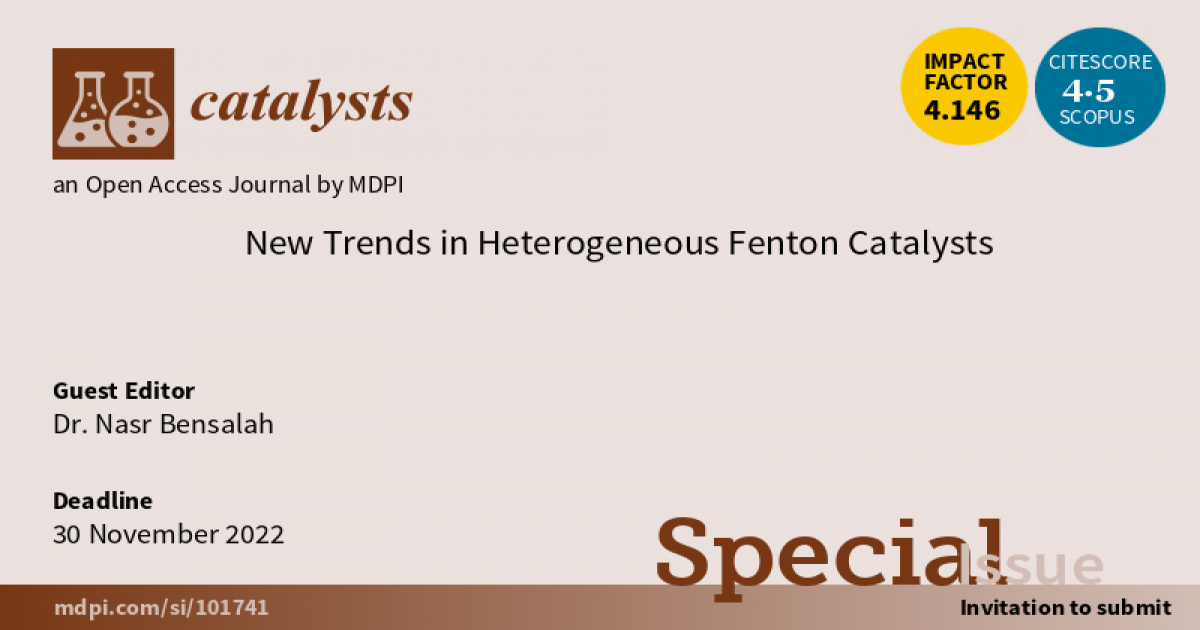New Trends in Heterogeneous Fenton Catalysts
A special issue of Catalysts (ISSN 2073-4344). This special issue belongs to the section "Catalysis in Organic and Polymer Chemistry".
Deadline for manuscript submissions: closed (30 November 2022) | Viewed by 4701

Special Issue Editor
Special Issue Information
Dear Colleagues,
The Fenton process has gained substantial interest in water and soil treatment applications due to its ability to degrade pollutants at great efficiencies through the in situ generation of hydroxyl radicals (·OH). In the classic Fenton process, the catalytic decomposition of hydrogen peroxide (H2O2) by ferrous iron (Fe2+) produces ·OH radicals. However, high amounts of Fe2+ are needed to attain complete removal of pollutants due to the slowness of Fe2+ regeneration. The heterogeneous Fenton process involves the reaction of H2O2 with a solid Fe(II)-containing catalyst, which produces ·OH radicals on the surface for the complete mineralization or oxidation of pollutants into smaller compounds. The Fenton process is believed to be a more cost-effective technology than other AOPs, as the process utilizes low-cost Fe-based catalysts and can be coupled with solar energy (photo-Fenton) to accelerate the recovery of Fe(II) from Fe(III) in the catalyst. With recent advancements in research, novel iron-based catalysts, such as nanoscale zero-valent iron (nZVI), multi-metal compounds, and composites containing zeolite, carbon-based compounds, clays, and metal-organic frameworks (MOF) as supporting materials, have been developed for Fenton-based processes. In addition, non-iron-based catalysts have also been shown to be effective in pollutant degradation via Fenton-like reactions, including Ce-, Cr-, Cu-, Mn-, and Ni-based materials. This Special Issue will focus on experimental and theoretical investigations of novel heterogeneous Fenton catalysts with ideal properties, such as enhanced catalytic activities (nZVI), stability (MOF, supported catalysts), conductivity (carbon-based support), reusability (supported catalysts), and a wider pH range of activity (non-iron-based materials) compared to conventional heterogeneous Fenton catalysts.
Dr. Nasr Bensalah
Guest Editor
Manuscript Submission Information
Manuscripts should be submitted online at www.mdpi.com by registering and logging in to this website. Once you are registered, click here to go to the submission form. Manuscripts can be submitted until the deadline. All submissions that pass pre-check are peer-reviewed. Accepted papers will be published continuously in the journal (as soon as accepted) and will be listed together on the special issue website. Research articles, review articles as well as short communications are invited. For planned papers, a title and short abstract (about 250 words) can be sent to the Editorial Office for assessment.
Submitted manuscripts should not have been published previously, nor be under consideration for publication elsewhere (except conference proceedings papers). All manuscripts are thoroughly refereed through a single-blind peer-review process. A guide for authors and other relevant information for submission of manuscripts is available on the Instructions for Authors page. Catalysts is an international peer-reviewed open access monthly journal published by MDPI.
Please visit the Instructions for Authors page before submitting a manuscript. The Article Processing Charge (APC) for publication in this open access journal is 2200 CHF (Swiss Francs). Submitted papers should be well formatted and use good English. Authors may use MDPI's English editing service prior to publication or during author revisions.
Keywords
- heterogeneous Fenton catalysts: synthesis and characterization.
- homogeneous and heterogeneous Fenton processes: comparison
- enhanced catalytic activity in heterogeneous Fenton process
- supported Fenton catalysts - MOFs and MXene as Fenton catalysts
- carbon-based support for Fenton catalysts
- natural heterogeneous Fenton catalysts
- pH-independent Fenton catalysts
- non-iron-based Fenton catalysts
- heterogeneous photo-Fenton
- heterogeneous electro-Fenton
Benefits of Publishing in a Special Issue
- Ease of navigation: Grouping papers by topic helps scholars navigate broad scope journals more efficiently.
- Greater discoverability: Special Issues support the reach and impact of scientific research. Articles in Special Issues are more discoverable and cited more frequently.
- Expansion of research network: Special Issues facilitate connections among authors, fostering scientific collaborations.
- External promotion: Articles in Special Issues are often promoted through the journal's social media, increasing their visibility.
- Reprint: MDPI Books provides the opportunity to republish successful Special Issues in book format, both online and in print.
Further information on MDPI's Special Issue policies can be found here.





